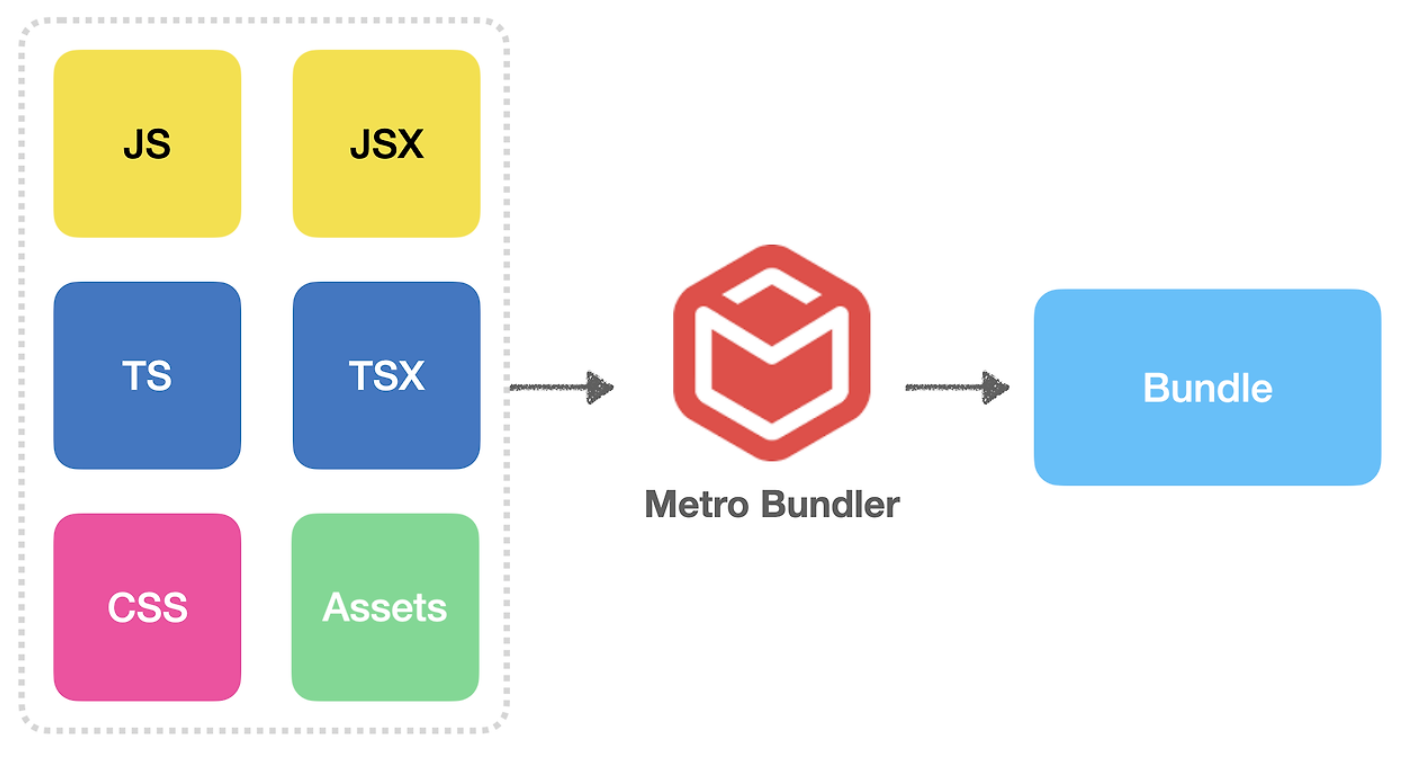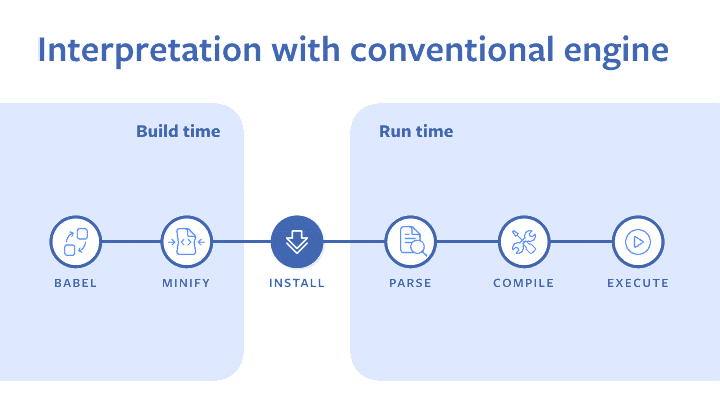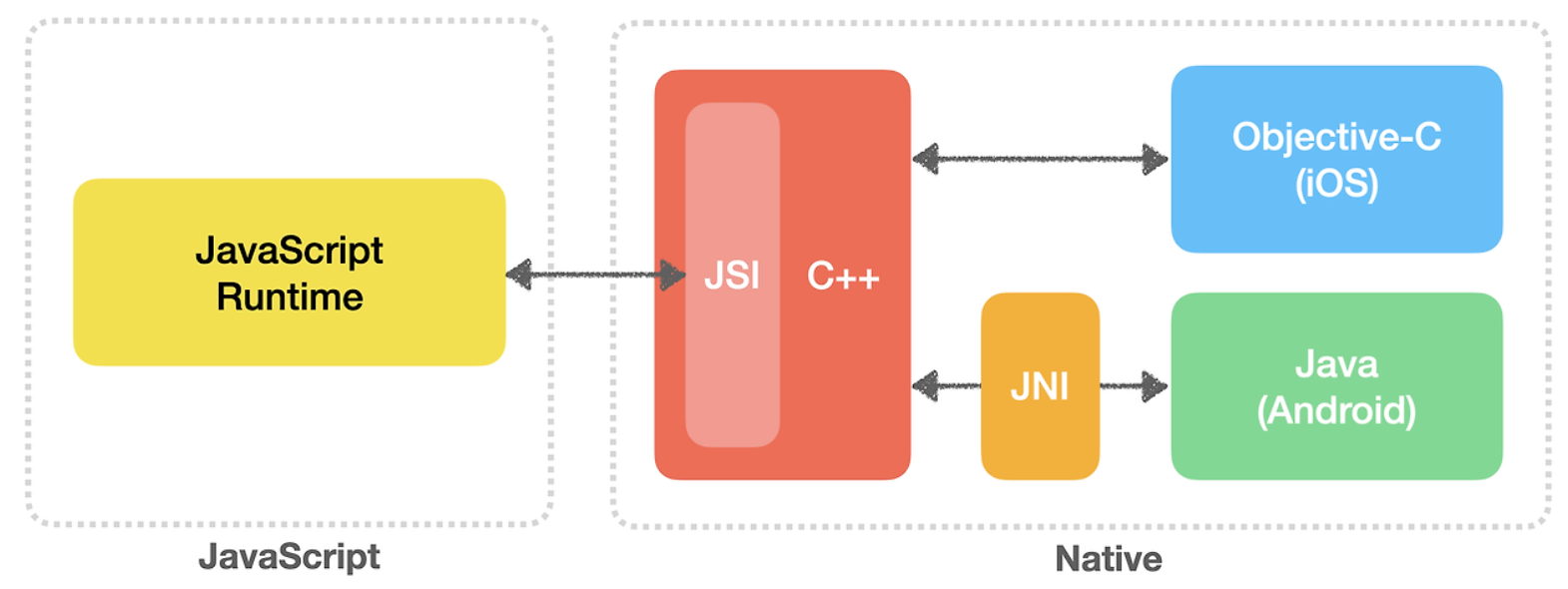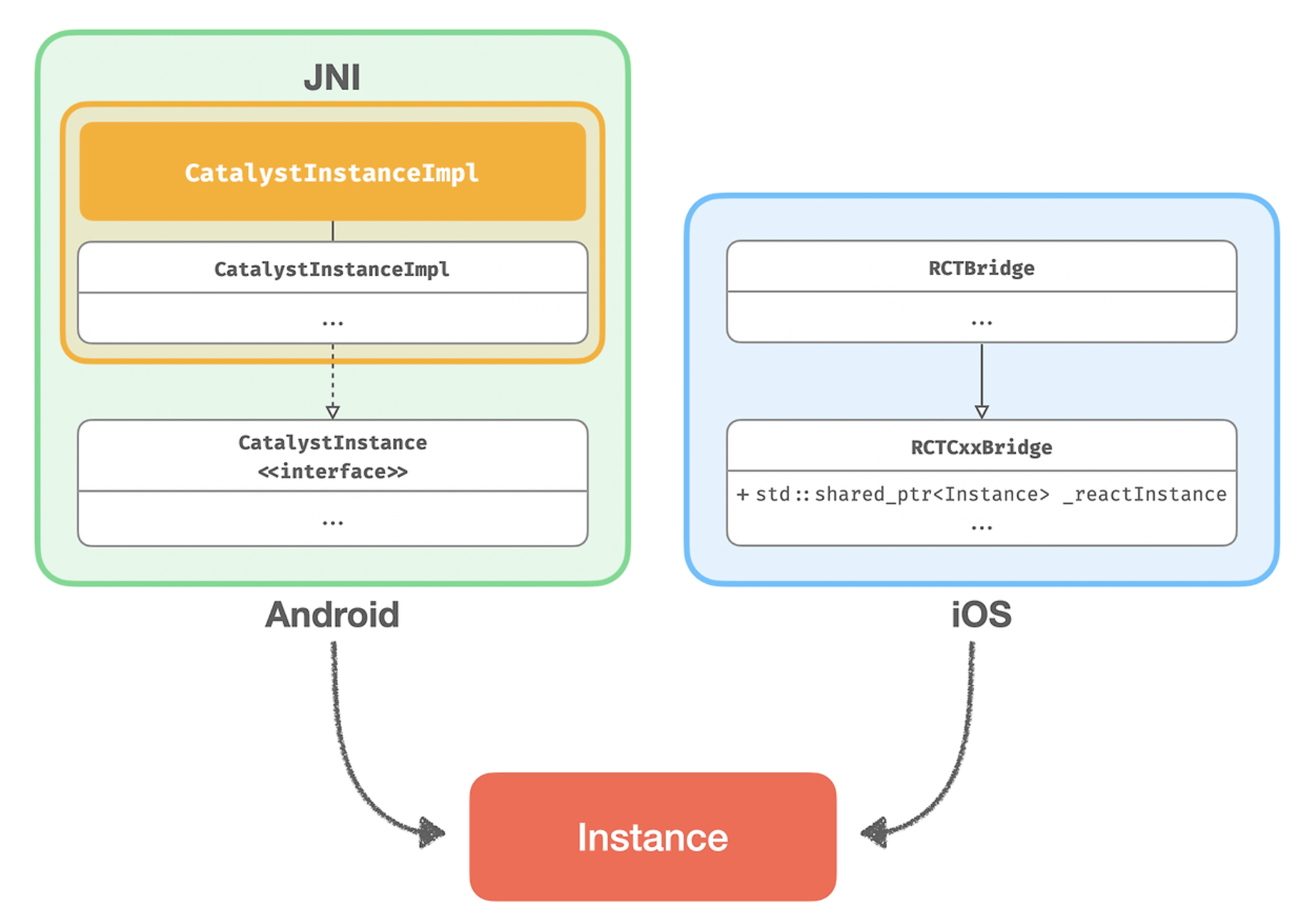React Native Under the Hood
이근혁님의 해당 글을 읽고, 간단 정리
번들러 (Bundler)

React Native의 기본 번들러인 Metro는 아래와 같은 과정을 거쳐 번들링을 수행한다.
- 모듈 해석(module Resolve)
- import 구문 찾기
- …tree shaking x
- 주입(inject)
- Polyfill
- object.es8.js
- console.js
- 적용 완료되었다면 console 객체에 _isPolyfilled 속성을 true로 설정한다.
- error-guard.js
- react native 초기화 - InitializeCore.js(RN) ⇒ loadMetroConfig.ts(Metro)
- Polyfill
- 변환(transform)
- babel을 통해 처리,
metro-react-native-babel-preset>> @react-native/babel-preset
- babel을 통해 처리,
- 사전 컴파일(pre-compilation ⇒ hermes Engine)

- Hermes Engine은 빌드타임에 미리 parse, compile까지 진행 ⇒ 즉시 실행가능한 Bytecode 형태로 변환
- release만 O, debug환경에서는 X
- 개발 서버
- Metro 서버에서 빌드를 진행 후, localhost:8080을 통해 번들을 전달함
런타임

-
네이티브
- core instance 생성(Android: JNI를 이용), 생성 후 런타임과 관련된 모듈들이 구성된다.

- JSI(JavaScript Interface)는 자바스크립트 엔진의 인터페이스를 추상화한 API인데, 이를 통해 복잡한 코드 구현 없이 JSI를 통해 자바스크립트 런타임과 상호작용 할 수 있다.
- core instance 생성(Android: JNI를 이용), 생성 후 런타임과 관련된 모듈들이 구성된다.
-
자바스크립트 런타임(JS Engine)
- 자바스크립트 런타임(엔진)은 성능을 위해 대부분 C/C++ 기반으로 구현되어 있다.
- JSC(JavaScript Core)
- Hermes
- 모두 JSExecutorFactory를 통해 런타임 인스턴스가 생성된다
- proxy runtime → V8(debug only)
-
makeJSCRuntime() - JSCRuntime.cpp
class JSCRuntime : public jsi::Runtime {
// ...
std::unique_ptr<jsi::Runtime> makeJSCRuntime() {
return std::make_unique<JSCRuntime>();
} -
JSCExecutorFactory() - JSCExecutorFactory.mm
namespace facebook::react {
std::unique_ptr<JSExecutor> JSCExecutorFactory::createJSExecutor(
std::shared_ptr<ExecutorDelegate> delegate,
std::shared_ptr<MessageQueueThread> __unused jsQueue)
{
return std::make_unique<JSIExecutor>(
facebook::jsc::makeJSCRuntime(), delegate, JSIExecutor::defaultTimeoutInvoker, runtimeInstaller_);
}
} -
RCTAppSetupDefaultJsExecutorFactory() - RCTAppSetupUtils.mm
std::unique_ptr<facebook::react::JSExecutorFactory> RCTAppSetupDefaultJsExecutorFactory(
RCTBridge *bridge,
RCTTurboModuleManager *turboModuleManager,
const std::shared_ptr<facebook::react::RuntimeScheduler> &runtimeScheduler)
{
// Necessary to allow NativeModules to lookup TurboModules
[bridge setRCTTurboModuleRegistry:turboModuleManager];
#if RCT_DEV
/**
* Instantiating DevMenu has the side-effect of registering
* shortcuts for CMD + d, CMD + i, and CMD + n via RCTDevMenu.
* Therefore, when TurboModules are enabled, we must manually create this
* NativeModule.
*/
[turboModuleManager moduleForName:"RCTDevMenu"];
#endif // end RCT_DEV
#if USE_HERMES
return std::make_unique<facebook::react::HermesExecutorFactory>(
#else
return std::make_unique<facebook::react::JSCExecutorFactory>(
#endif // USE_HERMES
facebook::react::RCTJSIExecutorRuntimeInstaller(
[turboModuleManager, bridge, runtimeScheduler](facebook::jsi::Runtime &runtime) {
if (!bridge || !turboModuleManager) {
return;
}
if (runtimeScheduler) {
facebook::react::RuntimeSchedulerBinding::createAndInstallIfNeeded(runtime, runtimeScheduler);
}
[turboModuleManager installJSBindings:runtime];
}));
} -
jsExecutorFactoryForBridge() - RCTRootViewFactory.mm
#pragma mark - RCTCxxBridgeDelegate
- (std::unique_ptr<facebook::react::JSExecutorFactory>)jsExecutorFactoryForBridge:(RCTBridge *)bridge
{
_runtimeScheduler = std::make_shared<facebook::react::RuntimeScheduler>(RCTRuntimeExecutorFromBridge(bridge));
if (RCTIsNewArchEnabled()) {
std::shared_ptr<facebook::react::CallInvoker> callInvoker =
std::make_shared<facebook::react::RuntimeSchedulerCallInvoker>(_runtimeScheduler);
RCTTurboModuleManager *turboModuleManager =
[[RCTTurboModuleManager alloc] initWithBridge:bridge
delegate:_turboModuleManagerDelegate
jsInvoker:callInvoker];
_contextContainer->erase("RuntimeScheduler");
_contextContainer->insert("RuntimeScheduler", _runtimeScheduler);
return RCTAppSetupDefaultJsExecutorFactory(bridge, turboModuleManager, _runtimeScheduler);
} else {
return RCTAppSetupJsExecutorFactoryForOldArch(bridge, _runtimeScheduler);
}
} -
start() - RCTCxxBridge.mm
// Prepare executor factory (shared_ptr for copy into block)
std::shared_ptr<JSExecutorFactory> executorFactory;
if (!self.executorClass) {
if ([self.delegate conformsToProtocol:@protocol(RCTCxxBridgeDelegate)]) {
id<RCTCxxBridgeDelegate> cxxDelegate = (id<RCTCxxBridgeDelegate>)self.delegate;
executorFactory = [cxxDelegate jsExecutorFactoryForBridge:self];
}
if (!executorFactory) {
auto installBindings = RCTJSIExecutorRuntimeInstaller(nullptr);
#if USE_HERMES
executorFactory = std::make_shared<HermesExecutorFactory>(installBindings);
#else
executorFactory = std::make_shared<JSCExecutorFactory>(installBindings);
#endif
}
} else {
id<RCTJavaScriptExecutor> objcExecutor = [self moduleForClass:self.executorClass];
executorFactory.reset(new RCTObjcExecutorFactory(objcExecutor, ^(NSError *error) {
if (error) {
[weakSelf handleError:error];
}
}));
}
-
JSExecutorFactory() - JSExecutor.h
class JSExecutorFactory {
public:
virtual std::unique_ptr<JSExecutor> createJSExecutor(
std::shared_ptr<ExecutorDelegate> delegate,
std::shared_ptr<MessageQueueThread> jsQueue) = 0;
virtual ~JSExecutorFactory() {}
};class RN_EXPORT JSExecutor {
public:
/**
* Prepares the JS runtime for React Native by installing global variables.
* Called once before any JS is evaluated.
*/
virtual void initializeRuntime() = 0;
/**
* Execute an application script bundle in the JS context.
*/
virtual void loadBundle(
std::unique_ptr<const JSBigString> script,
std::string sourceURL) = 0;
/**
* Add an application "RAM" bundle registry
*/
virtual void setBundleRegistry(
std::unique_ptr<RAMBundleRegistry> bundleRegistry) = 0;
/**
* Register a file path for an additional "RAM" bundle
*/
virtual void registerBundle(
uint32_t bundleId,
const std::string& bundlePath) = 0;
/**
* Executes BatchedBridge.callFunctionReturnFlushedQueue with the module ID,
* method ID and optional additional arguments in JS. The executor is
* responsible for using Bridge->callNativeModules to invoke any necessary
* native modules methods.
*/
virtual void callFunction(
const std::string& moduleId,
const std::string& methodId,
const folly::dynamic& arguments) = 0;
/**
* Executes BatchedBridge.invokeCallbackAndReturnFlushedQueue with the cbID,
* and optional additional arguments in JS and returns the next queue. The
* executor is responsible for using Bridge->callNativeModules to invoke any
* necessary native modules methods.
*/
virtual void invokeCallback(
const double callbackId,
const folly::dynamic& arguments) = 0;
virtual void setGlobalVariable(
std::string propName,
std::unique_ptr<const JSBigString> jsonValue) = 0;
virtual void* getJavaScriptContext() {
return nullptr;
}
/**
* Returns whether or not the underlying executor supports debugging via the
* Chrome remote debugging protocol. If true, the executor should also
* override the \c createAgentDelegate method.
*/
virtual bool isInspectable() {
return false;
}
/**
* The description is displayed in the dev menu, if there is one in
* this build. There is a default, but if this method returns a
* non-empty string, it will be used instead.
*/
virtual std::string getDescription() = 0;
virtual void handleMemoryPressure([[maybe_unused]] int pressureLevel) {}
virtual void destroy() {}
virtual ~JSExecutor() = default;
virtual void flush() {}
static std::string getSyntheticBundlePath(
uint32_t bundleId,
const std::string& bundlePath);
static double performanceNow();
/**
* Get a reference to the \c RuntimeTargetDelegate owned (or implemented) by
* this executor. This reference must remain valid for the duration of the
* executor's lifetime.
*/
virtual jsinspector_modern::RuntimeTargetDelegate& getRuntimeTargetDelegate();
private:
/**
* Initialized by \c getRuntimeTargetDelegate if not overridden, and then
* never changes.
*/
std::optional<jsinspector_modern::FallbackRuntimeTargetDelegate>
runtimeTargetDelegate_;
};
- 자바스크립트 런타임(엔진)은 성능을 위해 대부분 C/C++ 기반으로 구현되어 있다.
-
초기 앱 실행 시 런타임(JSC 혹은 Hermes)이 초기화되고 이들과 상호작용 할 수 있는 기반이 마련되며, 상호작용은 프로젝트 구성에 따른 팩토리에서 생성된
JSExecutor를 통해 이루어진다.